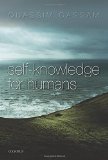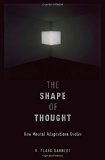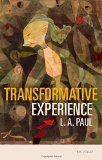January 4, 2015

Self-Knowledge for Humans by Quassim Cassam (Oxford University Press, 2014)
(kindle ed.), (amazon.co.uk), (UK kindle ed.)
Book description from the publisher:
Human beings are not model epistemic citizens. Our reasoning can be careless and uncritical, and our beliefs, desires, and other attitudes aren’t always as they ought rationally to be. Our beliefs can be eccentric, our desires irrational and our hopes hopelessly unrealistic. Our attitudes are influenced by a wide range of non-epistemic or non-rational factors, including our character, our emotions and powerful unconscious biases. Yet we are rarely conscious of such influences. Self-ignorance is not something to which human beings are immune.
In this book Quassim Cassam develops an account of self-knowledge which tries to do justice to these and other respects in which humans aren’t model epistemic citizens. He rejects rationalist and other mainstream philosophical accounts of self-knowledge on the grounds that, in more than one sense, they aren’t accounts of self-knowledge for humans. Instead he defends the view that inferences from behavioural and psychological evidence are a basic source of human self-knowledge. On this account, self-knowledge is a genuine cognitive achievement and self-ignorance is almost always on the cards.
As well as explaining knowledge of our own states of mind, Cassam also accounts for what he calls ‘substantial’ self-knowledge, including knowledge of our values, emotions, and character. He criticizes philosophical accounts of self-knowledge for neglecting substantial self-knowledge, and concludes with a discussion of the value of self-knowledge.
This book tries to do for philosophy what behavioural economics tries to do for economics. Just as behavioural economics is the economics of homo sapiens, as distinct from the economics of an ideally rational and self homo economics, so Cassam argues that philosophy should focus on the human predicament rather on the reasoning and self-knowledge of an idealized homo philosophicus.
Google Books preview:
See also: Book website
Comments (0)
- new books,self
January 3, 2015

The Shape of Thought: How Mental Adaptations Evolve by H. Clark Barrett (Oxford University Press, 2015)
(amazon.co.uk)
Book description from the publisher:
The Shape of Thought: How Mental Adaptations Evolve presents a road map for an evolutionary psychology of the twenty-first century. It brings together theory from biology and cognitive science to show how the brain can be composed of specialized adaptations, and yet also an organ of plasticity. Although mental adaptations have typically been seen as monolithic, hard-wired components frozen in the evolutionary past, The Shape of Thought presents a new view of mental adaptations as diverse and variable, with distinct functions and evolutionary histories that shape how they develop, what information they use, and what they do with that information.
The book describes how advances in evolutionary developmental biology can be applied to the brain by focusing on the design of the developmental systems that build it. Crucially, developmental systems can be plastic, designed by the process of natural selection to build adaptive phenotypes using the rich information available in our social and physical environments. This approach bridges the long-standing divide between “nativist” approaches to development, based on innateness, and “empiricist” approaches, based on learning. It shows how a view of humans as a flexible, culturally-dependent species is compatible with a complexly specialized brain, and how the nature of our flexibility can be better understood by confronting the evolved design of the organ on which that flexibility depends.
Google Books preview:
See also: Author’s webpage
Comments (0)
- cognitive science,human evolution,new books,psychology
December 31, 2014

Transformative Experience by L.A. Paul (Oxford University Press, 2015)
(kindle ed.), (amazon.co.uk), (UK kindle ed.)
Book description from the publisher:
As we live our lives, we repeatedly make decisions that shape our future circumstances and affect the sort of person we will be. When choosing whether to start a family, or deciding on a career, we often think we can assess the options by imagining what different experiences would be like for us. L. A. Paul argues that, for choices involving dramatically new experiences, we are confronted by the brute fact that we can know very little about our subjective futures. This has serious implications for our decisions. If we make life choices in the way we naturally and intuitively want to–by considering what we care about, and what our future selves will be like if we choose to have the experience–we only learn what we really need to know after we have already committed ourselves. If we try to escape the dilemma by avoiding an experience, we have still made a choice.
Choosing rationally, then, may require us to regard big life decisions as choices to make discoveries, small and large, about the intrinsic nature of experience, and to recognize that part of the value of living authentically is to experience one’s life and preferences in whatever way they may evolve in the wake of the choices one makes.
Using classic philosophical examples about the nature of consciousness, and drawing on recent work in normative decision theory, cognitive science, epistemology, and the philosophy of mind, Paul develops a rigorous account of transformative experience that sheds light on how we should understand real-world experience and our capacity to rationally map our subjective futures.
Google Books preview:
See also: Author’s website, Edge.org talk
Comments (0)
- cognitive science,new books,philosophy of mind





